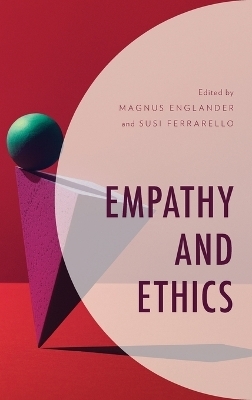
Empathy and Ethics
Rowman & Littlefield (Verlag)
978-1-5381-5410-6 (ISBN)
This book represents a unique indispensable reflection on the interconnection between ethics and empathy. To what extent is it right to be empathetic? Can empathy be unethical? Or is there an ethical obligation to be empathetic? Do we educate our citizens and train our professionals to use the right form of empathy?
Phenomenological ethics is a relatively new approach to ethics whose emphasis is put on the description of the lived-experience and the ethical phenomenon. The book is organized into three thematic sections: A) the main protagonists on the topic, B) the application of the results in psychology and health care, and C) further exploration of the topic in the arts. Each section will put an emphasis on one of the specific aspects of the interconnection between ethics and empathy.
The authors offer a phenomenological description of the thorny problem pertaining to the interconnection of empathy and ethics essential for professionals and scholars of different fields, such as philosophy, psychiatry, health science, psychology, and sociology.
Magnus Englander is phenomenological psychologist and associate professor at the Faculty of Health & Society at Malmö University. His research is situated within the interdisciplinary research context on the topic of health and society. Englander’s phenomenological research covers interdisciplinary perspectives such as social psychology, social psychiatry, and social cognition. He served for five years as the book review editor of the Journal of Phenomenological Psychology and is the author of multiple articles on phenomenological psychology. He is the volume editor of Phenomenology and the Social Context of Psychiatry. Susi Ferrarello is assistant professor at California State University, East Bay. She writes for Psychology Today. Among her publications there are novels, poetry, and academic books on philosophy, including Bioethics and Emotions, Phenomenology of Sex, Love, and Intimacy, The Ethics of Lived Experience: A Phenomenology and Husserl’s Ethics and Practical Intentionality.
Chapter 1, Why Empathy Means Nothing—and Everything—for Ethics, John J. Drummond
Chapter 2, Ethics, empathy, and vulnerability. Trust as a way of making sense of our vulnerability and dependability, Esteban Marín-Ávila
Chapter 3, Emotion, Reality, and Ownership, Craig Derksen
Chapter 4, Embracing Ambiguity: Simone de Beauvoir’s Responsive Ethics, Maren Wehrle
Chapter 5, The Personalistic Attitude: Edmund Husserl and Edith Stein on Empathy as the Intuition of the Person as Value, Dermot Moran
Chapter 6, The role of empathy in the affective twist of Husserl’s critique of an axiological and practical reason, Carlos Lobo
Chapter 7Phenomenology as Reverence: The Role of Reverence in the Phenomenological Method of Dietrich von Hildebrand, Alexander Montes
Chapter 8, “Against” empathy: from the isolated self to intersubjectivity in Martin Heidegger’s thinking, and the consequences for health care, Francesca Brencio
Chapter 9, Being (n)one of us: The ethical and the body, Henning Nörenberg
Chapter 10, Tomasello, Husserl, and the Cognitive Foundations of Morality, Andrea Staiti and Stefano Vincini
Chapter 11, Fiat cura, et pereat mundus: Husserl’s Phenomenology of Care and Commitment, Nicolas de Warren
Chapter 12, On the problem of the idealization of empathy and ethics, Magnus Englander and Susi Ferrarello
Chapter 13, Sharing and other illusions – Asymmetry in ‘moments of meeting’, Joona Taipale
Chapter 14, Thinking With the Heart: From the Responsiveness of the Flesh to the Ethics of Responsibility, Elodie Boublil
Chapter 15, What is moral about empathy? Some considerations about the link between empathy and moral judgment, Manuel Camassa
Chapter 16, Embodiment, Empathy, and the Call to Compassion: Engendering Care and Respect for ‘the Other’ in a More-Than-Human World, Scott D. Churchill
Chapter 17, Fictional Empathy, Imagination, and Knowledge of Value, Íngrid Vendrell Ferran
Chapter 18, Affective depth and value. On Theodor Lipps’s theory of aesthetic empathy, Jannik M. Hansen and Tone Roald
Chapter 19, Music and Empathic Spaces in Therapy and Improvisation, Jannik Mosekjær Hansen, Simon Høffding and Joel Krueger
Chapter 20, To step into the life of others. Professional action, empathy and an ethics of engagement, Eva Schwarz
Chapter 21, An Empathy-Based Phenomenological Ethic for Gaming, Michael Agostinelli
Chapter 22, Empathy, alterity, morality, Dan Zahavi
| Erscheinungsdatum | 02.09.2022 |
|---|---|
| Verlagsort | Lanham, MD |
| Sprache | englisch |
| Maße | 161 x 237 mm |
| Gewicht | 894 g |
| Themenwelt | Geisteswissenschaften ► Philosophie ► Ethik |
| Geisteswissenschaften ► Philosophie ► Philosophie der Neuzeit | |
| Geisteswissenschaften ► Psychologie ► Sozialpsychologie | |
| ISBN-10 | 1-5381-5410-2 / 1538154102 |
| ISBN-13 | 978-1-5381-5410-6 / 9781538154106 |
| Zustand | Neuware |
| Informationen gemäß Produktsicherheitsverordnung (GPSR) | |
| Haben Sie eine Frage zum Produkt? |
aus dem Bereich


